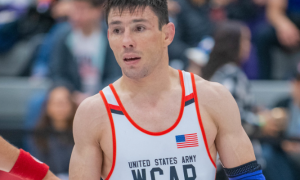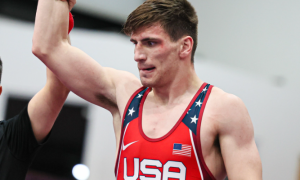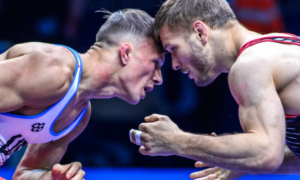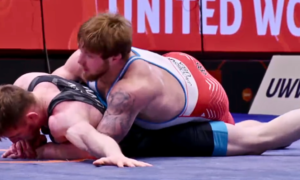A little less than two days have passed since Jacob Kaminski (92 kg, Ill) became the 62nd Cadet World medalist in US history. Bronze medal aside, what made Kaminski’s performance so impressive wasn’t just how he competed — which was poised, aggressively, and opportunistically — but also, by managing to earn his way onto the podium, he single-handedly changed what was surely going to be another “day after” narrative centering around America’s continued inability to perform at World-level events. Because certainly, if Kaminski doesn’t come back against Davyd Samsonov (UKR) or outmaneuver Richard Karelson (EST), everyone associated with the United States Greco-Roman program is operating with a very different perspective exiting Croatia.
There were two pivotal moments for Kaminski on Sunday. The first appeared during his battle with Samsonov. Down 6-3 to an experienced foreigner, Kaminski scored four on throw that completely altered the rest of the bout. After that sequence, both athletes were different. Samsonov’s approach was visibly shaky whereas Kaminski’s confidence only seemed to grow.
The second, and maybe the more obvious of the two, arrived in the opening period of the bronze-medal match. Karelson was awarded his requisite passivity/par terre chance. This meant everything — a US kid, down 1-0 already with a Cadet European bronze about to get a shot from par terre. Because for as tough and talented as Kaminski might be, Karelson rolling out four guts or two lifts right then and there certainly wouldn’t have shocked anyone watching in the arena (or at home via stream). But Kaminski held strong, didn’t panic, and bought his way back onto the feet. That he secured a step-out point later on in the first only added to the good feeling you must have had witnessing this all unfold.
Of course, Kaminski eventually poured it on in the second, coming away with a bevy of points accrued via countering Karelson’s bodylock attempts. That’s the way it had to happen, and maybe it was the most appropriate. If anything, Kaminski falling on top of a few throw attempts from his opponent showed that the US undoubtedly has athletes at its disposal who could and would perform at the highest level available on a consistent basis, provided more consistent opportunities to do so were readily available. But we’ll get to all that in a second.
Lewis & Luffman
On Friday, two athletes were indisputably hosed for the same reason, just on opposite sides. Hunter Lewis (55 kg, WI) was leading Murad Abbasov (AZE) 9-6 with just a few ticks of the clock remaining when Abbasov scored four on a lateral that for all intents and purposes looked suspiciously like a trip. Abbasov’s right leg made more than incidental contact with Lewis’ left, and that was that. The US challenged, because of course. And the challenge was denied, because, of course. And Lewis, one of the country’s most experienced international competitors, was sent packing to the repechage waiting game.
As for Luke Luffman (110 kg, Ill), he had won his first match of the morning by plowing over Nikolaos Ntounias (GRE) via fall. In the round-of-16, he was going back-and-forth with eventual fifth-place Marcel Abini (CZE) but found himself staring down the barrel of three-point deficit as time was running out. Luffman had previously tried his hand at an over/under bodylock but lost the position. Then with mere seconds left, he re-secured the hold and waffled Albini head over heels. Four points were offered and it looked like he had earned himself an extraordinarily thrilling victory. But — the points were not confirmed due to legs. The US challenged — and somehow lost despite the fact it was crystal clear an offensive leg foul had not occurred, the wrong call was upheld. Neither of these young men deserved to have their hearts broken due to egregious officiating class but that’s what happened. How it still does with replay technology is a question best left unanswered.
The timing
Maybe there was not such an advantage to that brisk four-week turnaround after all.
The scheduling of the Cadet World Championships was never intended to be used as a built-in excuse for the United States Greco program. We even touched on it in two separate occasions, first with National Team head coach Matt Lindland, and again a week ago here. Less time to worry, less time for developing high schoolers to outgrow weight classes, most of the athletes had at least tasted foreign competition before. And it was all true — there was good reason to dismiss the decidedly much-smaller gap between the Cadet Trials and the big show. It doesn’t mean anyone was lying to themselves, all involved understood the landscape. The task at hand was not underestimated. (BTW, next year’s Cadet Worlds are scheduled for the last weekend in July — Ed.)
But after a 3-11 performance over the weekend (counting the pair of robberies endured by Lewis and Luffman, respectively), the benefit of hindsight suggests what everyone already knew — no matter how capable a US age-group athlete is when participating in the classical style, the playing field on the international level remains uneven — and the only way that can ever possibly change is if there are more full-time athletes raising their collective hands to compete year-round (a heady concept given folkstyle’s death grip domestically), or the American wrestling leadership bothers to take a breath and recognize that the ways they are promoting the sport are also simultaneously killing it.
These boys didn’t fail in Croatia, but rather, they were failed when this country arrogantly decided long ago that its native style should be held in a higher esteem than the very “Olympic movement” it claims to champion.
2018 Cadet Greco-Roman World Championships
FINAL RESULTS
45 kg
GOLD: Ilias Iandarov (RUS) def. Hennadii Zavertailo (UKR) 17-7, TF
BRONZE: Edmond Nazaryan (BUL) def. Amirreza Dehbozorgi (IRI) 2-0
BRONZE: Gurban Gurbanov (AZE) def. Mizuki Araki (JPN) 2-0
48 kg
GOLD: Abror Atabaev (UZB) def. Sajjad Abbaspourragni (IRI) 4-4 (criteria)
BRONZE: Ishar Kurbayev (KAZ) def. Islam Aliev (RUS) 4-2
BRONZE: Arshad Arshad (IND) def. Leonid Moroz (MDA) via fall
51 kg
GOLD: Lazizkhon Uzbekov (UZB) def. Laishram Meitei (IND)
BRONZE: Hasrat Jafarov (AZE) def. Robert Karapetyan (ARM) 4-2
BRONZE: Merey Maulitkanov (KAZ) def. Baktiiar Akberdiev (KGZ) 2-1
55 kg
GOLD: Amirhossein Gholam Reza Khounsari def. Giorgi Pertaia (GEO) 7-0
BRONZE: Amirbek Sultonov (UZB) def. Manuel Stoica (ROU) 8-7
BRONZE: Din Mukhamed Koshkar (KAZ) def. Niklas Pontus Ohelen (SWE) 6-0
60 kg
GOLD: Serhat Kirik (TUR) def. Shahin Badaghi Mofrad (IRI) 4-1
BRONZE: Adam Hajizada (AZE) def. Pravesh Pravesh (IND) 6-3
BRONZE: Gagik Snjoyan (FRA) def. Vladyslav Yevtushenko (UKR) 6-4
65 kg
GOLD: Muslim Imadaev (RUS) def. Shant Khachatryan (ARM) 3-0
BRONZE: Hossein Ghasemi (IRI) def. Khvicha Ananidze (GEO) 7-0
BRONZE: Samuel Bellscheidt (GER) def. Bin Xu (CHN) 8-2
71 kg
GOLD: Alexandrin Gutu (MDA) def. Shu Yamada (JPN) 12-2, TF
BRONZE: Veisal Eyubov (KAZ) def. Petar Gornyashki (BUL) 5-0
BRONZE: Giorgi Shpetishvili (GEO) def. Abdullah Ates (TUR) 13-2, TF
80 kg
GOLD: Karen Khachatryan (ARM) def. Giorgi Tsopurashvili (GEO) 2-1
BRONZE: Turpan Bisultanov (DEN) def. David Zhytomyrsky (ISR) 7-1
BRONZE: Mohammad Naghousi (IRI) def. Bekzod Akhmedov (UZB) 6-1
92 kg
GOLD: Mohammad Nosrati (IRI) def. Aleksei Mileshin (RUS) 3-3 (criteria)
BRONZE: Jacob Kaminski (USA) def. Richard Karelson (EST) 9-1, TF
BRONZE: Osman Ayadin (TUR) def. Lasha Tvilidiani (GEO) 9-0, TF
110 kg
GOLD: Muhammet Bakir (TUR) def. Sarkhan Mammadov (AZE) 9-0, TF
BRONZE: Mikita Kavalski (BLR) def. Aleksandr Shaposhnikov (RUS) 3-1
BRONZE: Tomasz Wawrzynczyk (POL) def. Marcel Albini (CZE) 7-1
First Senior World Team Camp Begins in Oregon
The first Senior Greco-Roman World Team camp of 2018 began Monday, and for the second year in a row, it’s in Lindland’s neck of the woods (literally). Beautiful Eagle Creek, Oregon is the location for what will be two weeks of base conditioning and various team-building activities. If you read last week’s report, you know that the plan is to split the athletes up into small groups with each group boasting its own leader.
“Ten athletes is too big of a group, Lindland said two weeks ago. “You look at most small groups like the Navy Seals, they are small three or six-man teams. I think we do need to break our guys down into groups in order to bring them together. I think that is what is going to allow that team cohesiveness and unity to build, by breaking us down into smaller groups, and within each of those smaller groups they will be holding the other group accountable.”
We will work to provide you with updates, photos, and perspectives from Senior World Team as the week progresses.
Questions? Concerns? Feel like reaching out? Do so on Twitter, Facebook, and Instagram!
SUBSCRIBE TO THE FIVE POINT MOVE PODCAST
iTunes | Stitcher | Spreaker | Google Play Music | RSS


















